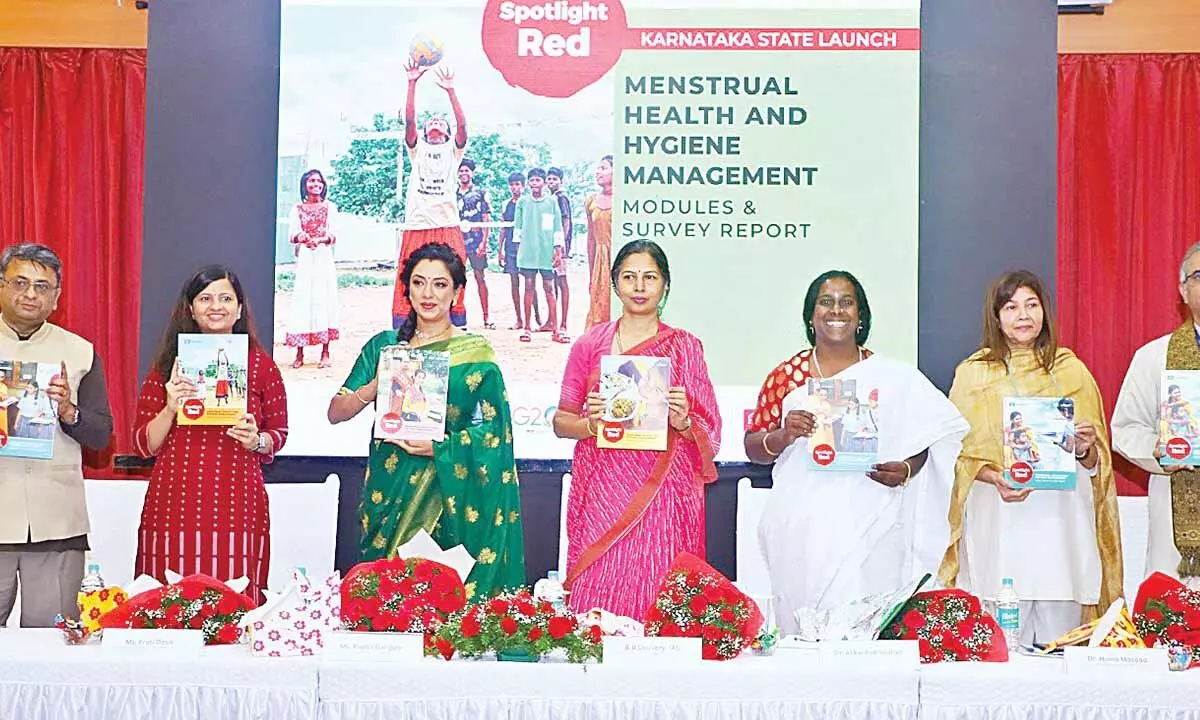Live
- Three killed in firing as violence breaks out amid Sambhal mosque survey in UP
- IPL 2025 Auction: Ravichandran Ashwin, Rachin Ravindra return to Chennai Super Kings
- Manipur: After over a week's closure, regular classes to resume in educational institutions
- Govt open to discuss all issues, says Kiren Rijiju on eve of Winter Session of Parliament
- Pakistan reports three new polio cases, 2024 tally reaches 55
- Multifold Increase in migratory bird population at TN bird sanctuary
- Archaka Maha Sabha in Jogulamba Gadwal District Highlights Key Demands for Priests' Welfare
- IPL 2025 Auction: Both Rahul and Starc are world-class players, says Delhi Capitals head coach Badani
- Committed to the Welfare of Brahmins - MLA Kuchukulla Rajesh Reddy
- MLA Shri Ganesh Participates in Maha Sudarshana Homam and Srinivasa Kalyanam in Secunderabad
Just In
50% of adolescent girls lack access to hygienic methods for managing periods


50% of adolescent girls lack access to hygienic methods for managing periods
Titled “Spotlight Red,” the teaching-learning modules offer comprehensive resources and strategies for learners, educators, menstruators, and community leaders.
Bengaluru: UNESCO India and Amrita Vishwa Vidyapeetham, have joined forces to launch a campaign aimed at raising awareness about menstrual health and hygiene management, particularly among women, including young girls attending school in Bengaluru during an event organized by the Gender Equality and Integrated Holistic Health Working Groups of C20 India at Amrita Vishwa Vidyapeetham’s Bengaluru Campus, with the support of OMNEX. Five teaching-learning modules address the various challenges associated with menstrual health and hygiene management, such as disability, gender, educators, young adults, and nutrition.
Titled “Spotlight Red,” the teaching-learning modules offer comprehensive resources and strategies for learners, educators, menstruators, and community leaders. Their purpose is to enhance understanding and skills related to menstruation management while fostering awareness about its societal impact. The modules aim to empower adolescents from diverse backgrounds, including girls with disabilities, by providing them with access to period and puberty education. Moreover, they seek to create a supportive environment through interventions at the school, state, and national levels, enabling these adolescents to continue their education.
More than 220 people attended the event, including girl students, teachers from various schools in Bengaluru, along with civil society organisations. The #KeepGirlsinSchool initiative enjoys the support of advocacy partners, including the UNESCO Chair for Gender Equality and Women’s Empowerment at Amrita Vishwa Vidyapeetham the Civil20 India Working Groups on Gender Equality and Integrated Holistic Health and OMNEX.
The Samagra Shikshana Karnataka, State Project Director, B B Cauvery said, “Collaboration with knowledge partners is vital, and we need to break the silence and remove the taboo surrounding menstruation. Acceptance and equality should be embraced by all. Together, we can create a society where everyone is treated with dignity and respect.”
While sharing her experience, Transgender rights activist, Dr Akkai Padmashali said, “ In 2012, I underwent gender affirmation surgery, and as I lay on the hospital bed in Bangalore, seven bedsheets soaked in blood, I emerged as a transgender woman. I shared this truth with my mother, who warned me of the challenges women face in society. She spoke of the monthly pain she endures, reminding me that pain knows no gender, sex, or sexuality. Pain is universal. And so, I questioned the constructs that bind us. Fortunately, the government in Karnataka has taken steps to address women’s concerns through guarantees and initiatives. I extend my gratitude for such inclusive perspectives which has instilled hope within us, ensuring that our diverse identities find acceptance in society.”
During the event, renowned Indian television actress, Rupali Ganguli, said, “Today, 1 in 5 girls drop out of school due to a lack of menstruation education and products. Shockingly, 70% of girls are unaware of periods when they first experience them. Even mothers who are girl’s closest friends, teachers, lack knowledge about the science of periods.”
The Gender Specialist at UNESCO New Delhi Multisectoral Regional Office, Dr. Huma Masood stated, “It is time to acknowledge the alarming statistics: an estimated 23 million girls drop out of school each year due to the lack of proper menstrual health and hygiene management. This partnership marks a crucial step forward in ensuring that every learner, every menstruator, is empowered and no one is left behind. With a comprehensive approach combining education and advocacy, we have developed five teaching learning modules dedicated to addressing this issue.”
During the event, UNESCO showcased a comprehensive survey and gap analysis report, accompanied by a series of short films that effectively portrayed different dimensions of Menstrual Health and Hygiene Management.

© 2024 Hyderabad Media House Limited/The Hans India. All rights reserved. Powered by hocalwire.com






